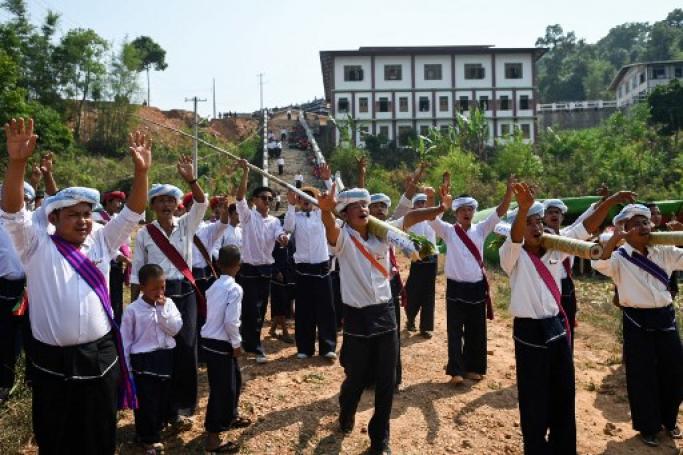Khun Kyaw Ha, an ethnic Pa-O man, claims he has faced oppression due to his ethnicity and how he is perceived to be different from the rest of the people of Myanmar.
“We, ethnic people, can never be equal to the Burmese people,” he told Mizzima.
Khun Kyaw Ha, whose parents are government employees, has suffered discrimination because of being an ethnic minority.
Pa-O is the seventh largest ethnic nationality in Myanmar, with a population of approximately 1.8 million to 2 million, as of 2010. The Bamar ethnic group make up the majority.
“As I am an ethnic person, my Burmese dialect is slurred. My facial features and the way I speak are different. They make fun of my style. My accent is the kind of thing they want to ridicule. They force me
to repeat words that I cannot speak out loud. Due to the teasing and mocking, I do not talk to anyone anymore,” said Khun Kyaw Ha.
School was tough.
“I felt I was different from others, and they would make fun when they heard my accent. Thus, I talked less and did not talk without necessity. Moreover, they underestimated me as I came from a village by saying that ‘Have you ever seen this?’, ‘You have never touched, eaten, or seen this before.’ I always encountered such issues at school,” said Khun Kyaw Ha.
Speaking on racism in Myanmar, it goes deep, he said. “We all live in this country, Myanmar. We all are the same human beings. It is not fair to discriminate against ethnic minorities. There is oppression among different tribes as well. There is racism even among different ethnic minorities.”
Even other ethnic groups can be less than civil.
“For instance, though both ethnic minority groups are not developing, the more developed group wants to oppress the less developed group. Oppression can be seen as well. The areas we lived in are behind in everything, such as education, economics, society and politics. Transportation and electricity are difficult. There is not enough water for drinking and domestic usage. In the meantime, due to the wars in some places, we live amid the sound of bullets.”
Shan State and many other ethnic areas of Myanmar have seen decades of fighting and tension.
“We are lagging in terms of development because of the wars. We need to fight back not only regarding discrimination against ethnicities but against the whole bullying system.”
“When I was at school, I lived among friends who neglected me. There were no friends who wanted to sit beside me as they thought I was not intelligent. And there were no friends who would eat lunch together with me. On a cleaning day, I had to work more than others because I am an ethnic minority,” said Khun Kyaw Ha.
Misunderstanding is rife.
“As I am a minority, some classmates thought I came from an orphanage and no one wanted to make friends with me. Even though I am not an orphan, they thought I am an orphan because I am an ethnic minority. Due to the civil war, we lost our parents in war in ethnic areas and families were separated. (In the past), people from mainland Myanmar did not know about wars (in the ethnic areas). Thus, instead of sympathizing, they neglect the lives of orphaned ethnic people,” said Khun Kyaw Ha.
Regarding discrimination in classrooms, Khun Kyaw Ha said that when exam grades came out, other students always wanted to know how well he did in the class.
The teachers were not always helpful.
“While studying, teachers would tell some students that even ‘Khun Kyaw Ha could do this, why couldn’t you do this?’ This showed that they thought that an ethnic minority student could never be equal to a Bamar (a member of the majority ethnic group in Myanmar) in education.”
After leaving school, things did not get better for Khun Kyaw Ha.
“When I started working, I faced discrimination from my employer. While others could take leave, it was very difficult for me to take leave. When we, many staff members, were late to work, I was the only one whose salary was cut. If there was an opportunity in the workplace, I could not get that opportunity because I am a minority and the opportunity would be given to someone else. However, I was always given hard work. They remember me only when they need to ask me to do something. I often experienced this kind of discrimination in every job.”
Pa-O is regarded as a Shan sub-ethnic group in Shan State. Other than Shan State, they live in Kayin (Karen) State, Kayah (Karenni) State, Mon State and Bago (Pegu) Region.
The traditional outfit of male Pa-O consists of long trousers and a black or navy jacket with a white shirt.
As for women, the outfit consists of a long coat, a long sleeve shirt and a longyi.
Myanmar is in the midst of crisis but Khun Kyaw Ha says he hopes the future involves a union where there is no discrimination against ethnic minorities.
“I want to try my best to ensure the next generation of Pa-O will not be oppressed as I have been,” he said.












